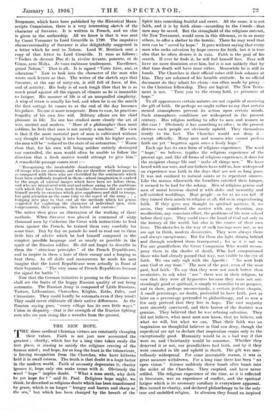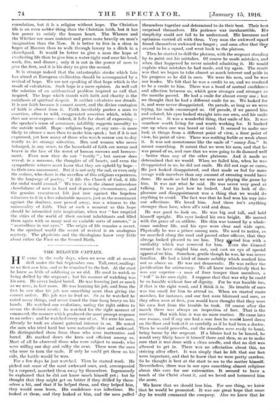THE NEW HOPE.
THE three cardinal Christian virtues are constantly changing their values. Faith is not just now accounted the greatest ; charity, which has for a long time taken easily the first place, is ceasing to satisfy the religious craving of the ; human mind ; and hope, for so long the least in the triumvirate, is forcing recognition from the Churches, who have hitherto ' held it in small esteem. The truth is that doubt is a huge factor in the modern world. Faith of necessity deprecates it, charity ignores it, hope only can make terms with it. Obviously the word " hope " implies doubt. "What a man seeth, why doth he yet hope for ? " said St. Paul. Religious hope might, we think, be described as religious doubt which has been transformed by grace, which is no longer "hungry and barren and sharp as the sea," but which has been changed by the breath of the
Spirit into something fruitful and sweet. All the same, it is not faith, and it is by faith alone—according to the Creeds—that men may be saved. But the stronghold of the religious outcast, the New Testament, would seem in this dilemma, as in so many others, to offer a shelter to the heretic. There he may read that men can be "saved by hope." It goes without saying that every man who seeks salvation by hope craves for faith, but it is true also that he often desires it in vain. Faith is the goal of his search. If ever he finds it, he will feel himself free. Fear will have no more dominion over him, but it is not unlikely that by that time death will have none either. Meanwhile he is still in bonds. The Churches in their official robes still look askance at
him. They are ashamed of his humble attitude. In no official document do they admit his claim—too often made by proxy—
to the Christian fellowship. They are logical. The New Testa- ment is not. "Turn you to the strong hold, ye prisoners of hope."
To all appearances certain natures are not capable of receiving the gift of faith. Or perhaps we ought rather to say that certain mental atmospheres prevent its action upon certain minds. Such atmospheric conditions are widespread in the pre-sent century. Has religion nothing to offer to men and women in this case 1 Obviously it has something to offer ; in the present distress such people are obviously upheld. They themselves testify to the fact. The Churches would not deny it-- except officially. Many men and women who cannot profess faith are yet "begotten again unto a lively hope."
Each age has its own form of religious experience. The word "hope," we believe, typifies the religious experience of the present age, and, like all forms of religious experience, it does for the recipient change life and ." make all things new." We have heard with our ears, and our fathers have told us, how widespread an experience was faith in the days that are not so long gone. It was not confined to natural saints or to repentant sinners. Like the manna wherewith the Israelites satisfied their hunger, it seemed to be had for the asking. Men of religious genius and men of moral heroism shared it with dolts and unworthy and self-satisfied worldlings. Most people—so far as we can tell—if they turned their minds to religion at all, did so in unquestioning faith. If they gave any thought to spiritual matters, if, we mean, they considered the matter with any devotion, any recollection, any conscious effort, the problems of life were solved before their eyes. They could trace the hand of Cod not only in the history of the world, but also in the course of their own lives. The obstacles in the way of such tracings were not, as we are apt to think, modern discoveries. They were always there and always conspicuous. But for them the light shining behind and through rendered them transparent ; for us it is not so. For our grandfathers the Great Companion Who would accom- pany them in the shades of death, Who had companioned those who had already passed that way, was visible to the eye of faith. We can only sigh with the Apostle : " No man !lath seen God at any time." The men of the past, even of the near past, had faith. To say that they were not much better than secularists, to ask what " use " there was in their religion, to vow that they were all hypocrites because they were not out- standingly good or spiritual, is simply to moralize to no purpose, and to show, perhaps unconsciously, a certain jealous chagrin. A small percentage, no doubt, pretended to have faith, just as later on a percentage pretended to philanthropy, and as now a few only pretend that they live in hope. The vast majority were sincerely convinced, and their horror of the doubter was genuine. They believed that he was refusing salvation. They
did not believe, what most men now know, that we believe, not what we will, but what we can. That their faith was an inspiration no thoughtful believer in God can deny, though the superficial are apt to declare that inspiration comes only to the exceptionally good. Humanity would be in a bad way if this were so, and Christianity would be nonsense. Whether they deserved it or not, our grandfathers had faith, and by it they were consoled in life and upheld in death. The gift was mar- vellously widespread. For some inscrutable reason, it was in great measure withdrawn. For a long time there has been "no open vision." Science suddenly threw bomb after bomb into the midst of the Churches. They emptied, and have never refilled. The religious experience of the time, as it is reflected in literature, was an experience of conflict, and the spiritual fatigue which is its necessary corollary is everywhere apparent. Men turned to charity, and declared philanthropy to be the only true and undefiled religion. In altruism they found an inspired consolation, but it is a religion Without hope. The Christian life is an even nobler thing than the Christian faith, but it has less power to satisfy the human heart. The Whence and the Whither are more insistent and press more heavily on man's imagination than the Now. It is better to live in a slum in hopes of Heaven than to walk through luxury to a ditch in a churchyard. It would be better to give a man the hope of everlasting life than to give him a water-tight roof over his head, work, fire, and dinner ; only it is not in the power of man to give the first, and it is his duty to give the second.
It is strange indeed that the catastrophic stroke which fate has aimed at European civilization should be accompanied by a revival of hope. We are not speaking of that hope which is the result of calculation. Such hope is a mere opinion. As well call the solution of an arithmetical problem inspired as call that inspired. The hope which stands with faith and charity is the antithesis of spiritual despair. It neither calculates nor dreads. It is not faith because it cannot assert., and the divine contagion of faith is absent from it. Faith inevitably pushes a man to assertion, often to wild, exaggerated assertion which, while it does not over-express--indeed, it falls far short of expressing-- the speaker's sense of assurance, infallibly suggests unreality to the outside world. Hope—religious hope, at any rate—is more likely to silence a man than to make him speak ; but if it is not expressed, yet how many of those who watch sorrow can to-day testify to its strange salvation. Men and women who never belonged, in any sense, to the household of faith are serene and brave in the face of the worst of human sorrows and bereave- ment. Even now they do not " testify " ; but sorrow- does reveal, in a measure, the thoughts of all hearts, and even the sympathetic witness must know that they are upheld by hope— to their own amazement. But it is not only the sad, or even only the serious, who share in the overflow of this religious experience. In the language of poetry, "it fills the Church of God, it fills the sinful world around." We trace it in the almost miraculous cheerfulness of men in hard and depressing circumstance, and the genuine resentment felt just now against the hopeless witnesses to it in a less admirable manner, just as the resentment against the doubter, now passed away, was a witness to the universality of faith. That at such a moment as this hope should be intensified into inspiration, when war "has emptied the cities of the world of their ancient inhabitants and filled them again with so many and so variable sorts of sorrows," is "marvellous in our eyes." The origin of life remains a secret. In the spiritual world the secret of revival is an analogous mystery. The physicists and the theologians know very little about either the First or the Second Bath.



































 Previous page
Previous page